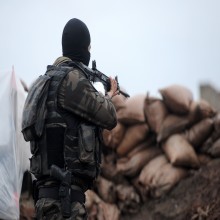If anyone killed a person not in retaliation for murder,or to spread mischief in the land It would be as if he killed all mankind,And if anyone saved a life,It would be as if he saved the life of all mankind
Just The Basics
Islam: A peaceful religion of worship and submission to God.
Muslim: A person who believes in and practices Islam. There are 1.6 billion Muslims in the world today from all races and backgrounds.
Allah: Arabic word for God. Allah is the God of Abraham, Moses, Jesus, and Muhammad. He is the Creator of all human beings.
Prophet Muhammad : The Last Prophet sent by God to deliver His message to all of humanity. He was born over 1400 years ago in the city of Mecca.
Quran (or Koran): The sacred book of Islam. The Quran is the Speech of God that was revealed to the Prophet Muhammad and written down during his life.
Sanctity of Life in Islam
- Islam holds human life, wealth, and dignity to be sacred.
- An aggression against life, wealth, and honor without any right to do so is a deadly sin that invites Divine anger.
- Acts of sabotage and violence to terrify civilians, shed blood, and inflict harm on people are forbidden in Islam.
- Islam is a religion that does not permit frightening people even by the threat of using arms, let alone actually using them!
- More so, Islam prohibits all forms of terrorism, sabotage, and destruction, and demands the heaviest punishment on those who commit such vicious acts.
- Islam is a religion that destined a cruel woman to Hell Fire who imprisoned a cat and prevented it from eating and drinking until it died.
- Islam is a religion that tells us how God appreciated and granted Paradise to a man who saved the life of a thirsty dog that he found licking mud for moisture.
- A religion like Islam would never permit shedding the blood, stealing the money, and committing vicious acts against the life, honor, and dignity of innocent people, whether they are Muslims or non-Muslims.
Quran On Taking Innocent Life
Quran 5:32
What is Jihad?
Jihad is not terrorism and terrorism is not Jihad.
The literal meaning of Jihad is struggle or effort, and it means much more than war.
- A believer's internal struggle to live a moral life.
- The struggle to build a good Muslim society.
- Just war to defend Islam, with force if necessary.
All religious people want to live their lives in the way that will please God. For most people, living God's way is a struggle. God sets high standards, and believers have to fight with their own selfish desires, no matter how much they love God. So Muslims make a great effort to live as God has instructed them by following the rules of the faith, being devoted to God, and doing everything they can to help other people. The Five Pillars of Islam form an exercise of Jihad in this sense, since a Muslim gets closer to God by performing them.
Other ways in which ordinary Muslims engage in 'Jihad' include:
- Learning the Quran by heart or engaging in religious study.
- Overcoming bad habits such as anger, greed, hatred, pride, or malice.
- Giving up smoking.
- Taking part in community service.
- Working for social justice.
- Forgiving someone who has hurt them.
Military Jihad
When Muslims or their faith or territory are under attack, Islam permits the believer to wage military war to protect them.
Islamic Law sets very strict rules for the conduct of such a war.
What Can Justify Military Jihad?
There are a number of reasons, but the Quran is clear that self-defence is always the underlying cause. Permissible reasons for military Jihad are:
- Self-defence
- Protecting the freedom of Muslims to practise their faith
- Protecting others, Muslim or not, against oppression
What Is Not Jihad?
- Terrorizing innocent civilians.
- Forcing people to convert to Islam.
- Taking revenge.
- Conquering other nations to colonise them.
- Taking territory for economic gain.
The Quran on Jihad
- Like all scriptures, Islamic texts must be read within the historical and socio-political contexts in which they were revealed.
- The Arabia where the Prophet Muhammad lived and received God's revelation was beset by tribal raids and cycles of vengeance and vendettas
- Arabia was located between two warring superpowers, the Roman and the Persian empires.
- It should not be surprising, therefore, that the Quran, like the Old Testament, addresses the conduct of war.
The Quran provided detailed guidelines and regulations regarding the conduct of war, for example: who is to fight and who is exempted, when hostilities must cease, and how prisoners should be treated.
First, the Quran emphasizes that peace, not violence is the norm. At the same time, Islam permits self-defense. In early Islam, defending the faith and the community under violent attack by an enemy was the primary aspect of the physical jihad which involved taking up arms.
God states in the Quran
Permission to fight has been given to those who have been attacked Because they are wronged.And indeed, God is Most Powerful
Quran 22:39
Second, permission to fight the aggressor is balanced by encouraging the making of peace:
If your enemy inclines toward peace,Then you too should seek peaceAnd put your trust in God
Quran 8:61
Third, the Quran stresses that the response to aggression must be proportional:
Whoever transgresses against you,Respond in kind
Quran 2: 294
Forth, from its inception, Islam forbade killing noncombatants. Women, children, the elderly, Christian monks, and rabbis were given immunity.
Islamic Stand on Suicide Bombings
High profile suicide bombings have been committed in the West and in many Muslim countries by terrorists professing to be Muslim. What does Islam say about suicide and suicide bombings?
FACT: Taking one’s life and suicide bombings are both impermissible in Islam.
Then the question arises, “Why are some terrorists committing suicide and spreading terror in the name of Islam?” The connection between suicide bombings and Islam has been studied by Prof. Robert Pape of the University of Chicago and author of the book, Dying to Win: The Strategic Logic of Suicide Terrorism. In “Blowing Up an Assumption,” a New York Times editorial published on Wednesday, 18 May 2005, he wrote,
‘Since Muslim terrorists professing religious motives have perpetrated many of the attacks, it might seem obvious that Islamic fundamentalism is the central cause, and thus the wholesale transformation of Muslim societies into secular democracies, even at the barrel of a gun, is the obvious solution. However, the presumed connection between suicide terrorism and Islamic fundamentalism is misleading, and it may spur American policies that are likely to worsen the situation.
The leading instigator of suicide attacks is the Tamil Tigers in Sri Lanka, a Marxist-Leninist group whose members are from Hindu families but who are adamantly opposed to religion. This group committed 76 of the 315 incidents, more than Hamas (54) or Islamic Jihad (27). Even among Muslims, secular groups like the Kurdistan Workers' Party, the Popular Front for the Liberation of Palestine and the Al Aksa Martyr Brigades account for more than a third of suicide attacks...’
Misunderstanding: Many people raise the question that if Muslims are so opposed to what terrorists do in the name of Islam, then why don’t Muslims do something about it?
FACTS:
- The recognized and well-known scholars of Islam are the voice of authority within the Islamic community. Different councils of Islamic scholars exist.
- To find out Islam’s position on terrorism, one sees that September 11 (and subsequent terrorist acts) were condemned by virtually all Islamic scholars, leaders, councils, organizations, and countries, yet they received little or no media coverage.
- Muslims have consistently and publicly condemned terrorism and distanced themselves from it, but many have chosen not to listen.
Terrorist Acts Condemned by Muslim Organizations & Islamic Scholars
The ‘Kuala Lumpur Declaration On International Terrorism’ by the foreign ministers of Muslim countries held in 2002 unanimously condemned terrorism[1]
More than fifty professors of Islamic Studies and Middle Eastern Studies from the United States and Canada, and members of the American Academy of Religion in Atlanta, GA, have also condemned terrorism.[2]
The Grand Mufti of Saudi Arabia, the highest religious authority of that country, said at the time,
“That these matters that have taken place in the United States and whatever else is of their nature of plane hijackings and taking people hostage or killing innocent people, without a just cause, this is nothing but a manifestation of injustice, oppression and tyranny, which the Islamic Law does not sanction or accept, rather it is expressly forbidden and it is amongst the greatest of sins.”[3]
Also, Yusuf Al-Qaradawi, a well-known Islamic scholar much respected in the Arab world, condemned attacks against civilians as forbidden in Islam.[4]
Conclusion
conclusion
- 1
Terrorism is not jihad and terrorists are not holy warriors or martyrs.
- 2
Islam does not instruct believers to threaten and attack civilians.
- 3
Islam does not command Muslims to randomly kill the “infidels” and terrorize civilians.
- 4
Terrorists go far beyond the Islamic criteria for a just war and recognize no limits, employing any weapons or means. They reject the Islamic law's regulations regarding the goals and legitimate means for a just war:
- 5
war must be declared by the ruler or head of state
- 6
violence must be proportional and that only the necessary amount of force should be used to repel the enemy
- 7
innocent civilians should not be targeted
Today, misguided individuals and groups like al-Qaeda and ISIS have declared illegitimate and unholy wars of terrorism in the name of Islam. They do not represent Islam.
references
- OIC. Kuala Lumpur Declaration On International Terrorism. On-line. Available from Internet,http://www.oic-oci.org/english/conf/fm/11_extraordinary/declaration.htm, accessed 30 August 2014.
- On-line. Available from Internet, http://groups.colgate.edu/aarislam/response.htm, accessed 30 August 2014.Professor Charles Kurzman, University of North Carolina. Islamic Statements Against Terrorism. On-line. Available from Internet, http://kurzman.unc.edu/islamic-statements-against-terrorism, accessed 30 August 2014.
- Dr. Jan G. Linn. 2004. What's Wrong with the Christian Right. Brown Walker Press. 80-81.
- Dr. Jan G. Linn. 2004. What's Wrong with the Christian Right. Brown Walker Press. 82.



